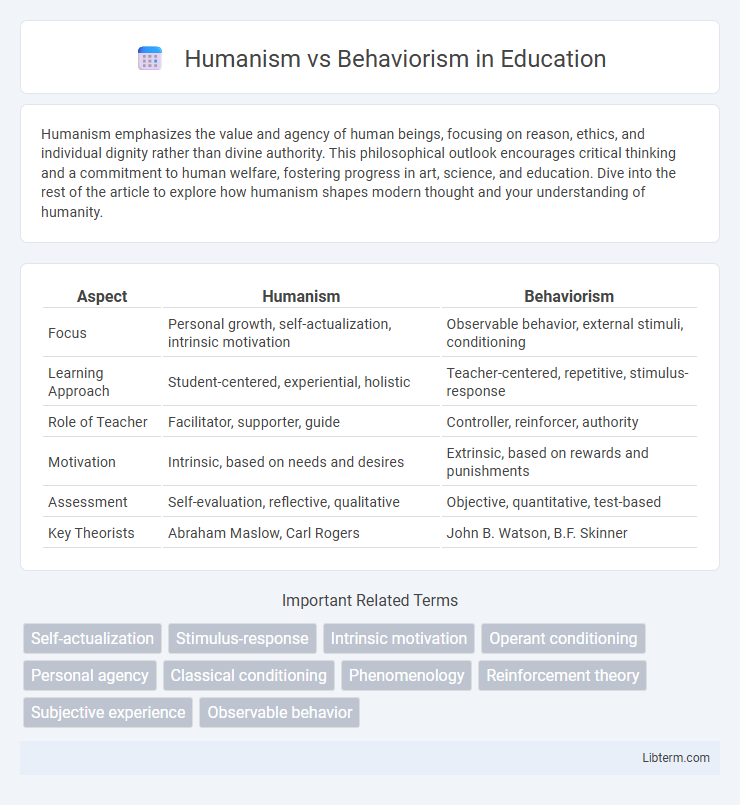Humanism emphasizes the value and agency of human beings, focusing on reason, ethics, and individual dignity rather than divine authority. This philosophical outlook encourages critical thinking and a commitment to human welfare, fostering progress in art, science, and education. Dive into the rest of the article to explore how humanism shapes modern thought and your understanding of humanity.
Table of Comparison
| Aspect | Humanism | Behaviorism |
|---|---|---|
| Focus | Personal growth, self-actualization, intrinsic motivation | Observable behavior, external stimuli, conditioning |
| Learning Approach | Student-centered, experiential, holistic | Teacher-centered, repetitive, stimulus-response |
| Role of Teacher | Facilitator, supporter, guide | Controller, reinforcer, authority |
| Motivation | Intrinsic, based on needs and desires | Extrinsic, based on rewards and punishments |
| Assessment | Self-evaluation, reflective, qualitative | Objective, quantitative, test-based |
| Key Theorists | Abraham Maslow, Carl Rogers | John B. Watson, B.F. Skinner |
Introduction to Humanism and Behaviorism
Humanism emphasizes individual potential, self-actualization, and the importance of personal growth, positioning humans as inherently good and motivated by internal drives. Behaviorism, founded on observable and measurable behaviors, asserts that all behaviors are acquired through conditioning without consideration of internal thoughts or feelings. These psychological perspectives offer contrasting views on human nature and learning processes, shaping approaches to therapy, education, and personality development.
Historical Development of Both Theories
Humanism emerged in the mid-20th century as a reaction against the deterministic nature of behaviorism, emphasizing individual experience, free will, and self-actualization through pioneers like Carl Rogers and Abraham Maslow. Behaviorism, established earlier in the early 1900s by John B. Watson and later advanced by B.F. Skinner, focused on observable behaviors and external stimuli, rejecting introspection and internal mental states. The historical development of these theories reflects a paradigm shift from behaviorism's empirical methods to humanism's focus on personal growth and subjective experience.
Core Principles of Humanism
Humanism emphasizes individual potential, self-actualization, and the inherent goodness of people, focusing on personal growth and subjective experiences. It values free will, conscious choice, and the holistic development of the whole person rather than just observable behaviors. In contrast to behaviorism's external conditioning, humanism advocates for empathy, authenticity, and a supportive environment that nurtures creativity and self-awareness.
Key Concepts in Behaviorism
Behaviorism centers on observable behaviors, emphasizing stimulus-response relationships and reinforcing learning through rewards and punishments. Key concepts include classical conditioning, where behaviors are learned via association, and operant conditioning, which involves learning from consequences to increase or decrease behavior frequency. Unlike humanism, behaviorism excludes internal mental states, prioritizing measurable actions for a scientific understanding of learning and behavior modification.
Humanism: Focus on Individual Potential
Humanism emphasizes the inherent potential and unique qualities of each individual, focusing on personal growth, self-actualization, and intrinsic motivation. This approach values subjective experience and human creativity as essential elements in learning and development. Humanistic psychology contrasts with behaviorism by prioritizing internal mental states over observable behaviors.
Behaviorism: Emphasis on Observable Behavior
Behaviorism prioritizes the study of observable behavior over internal mental states, emphasizing measurable and quantifiable actions in response to stimuli. It relies on principles such as conditioning and reinforcement to explain learning processes, rejecting introspection and subjective experiences as scientific data. This approach underpins techniques like behavior modification and systematic desensitization in applied psychology.
Differences in Learning Approaches
Humanism emphasizes personal growth and self-actualization, focusing on intrinsic motivation and the learner's active role in the learning process. Behaviorism relies on observable behaviors and external stimuli, using reinforcement and conditioning to shape learning outcomes. The humanistic approach prioritizes emotional and cognitive development, whereas behaviorism centers on measurable responses and behavior modification.
Impact on Education and Therapy
Humanism emphasizes personal growth and self-actualization, influencing education by fostering student-centered learning and promoting intrinsic motivation. Behaviorism, centered on observable behavior modification, impacts education through structured reinforcement techniques and skill-based training, while in therapy it uses conditioning methods to alter maladaptive behaviors. Both approaches shape therapeutic practices, with humanism prioritizing empathy and client autonomy, and behaviorism focusing on measurable behavioral change.
Criticisms of Humanism and Behaviorism
Humanism faces criticism for its lack of empirical evidence and scientific rigor, often being viewed as overly idealistic and difficult to test through experimental methods. Behaviorism is criticized for ignoring internal mental states and emotions, reducing human behavior to mere stimulus-response patterns without acknowledging cognitive processes. Both perspectives are challenged for their limitations in fully explaining the complexity of human experience and psychological functioning.
Integrating Humanism and Behaviorism in Modern Psychology
Integrating humanism and behaviorism in modern psychology enhances therapeutic outcomes by combining humanism's emphasis on individual potential and subjective experience with behaviorism's focus on observable behavior and empirical methods. Techniques such as cognitive-behavioral therapy (CBT) exemplify this integration by addressing thought patterns while fostering personal growth and self-awareness. This blended approach promotes holistic mental health treatment through measurable behavior change alongside empathetic, client-centered care.
Humanism Infographic

 libterm.com
libterm.com